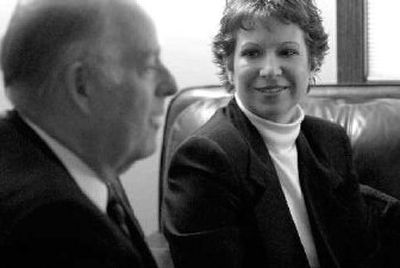Business focus: Counselor helps clients heal with hypnotherapy

People and their problems are the common threads connecting Dr. Jim Park to his assorted careers.
He started out in the ‘60s as a California police officer, fire captain, emergency medical technician, detective and Vietnam veteran. He investigated child abuse cases, intervened in gang situations and worked as a school resource officer, assigned to counsel and mentor students. Today, as a marriage and family therapist with a doctorate in clinical psychology, Park heals society’s wounds using a mysterious method: hypnosis.
The American Medical Association approved hypnosis for medical use in 1958, despite the controversy surrounding what it is and exactly how it works. Hypnosis has been used since ancient times to induce a state of relaxed, concentrated attention where one is receptive to suggestion.
Park admits that he was not convinced about hypnosis as a treatment option when he first studied it as an elective class in the ‘80s.
“I was very skeptical, with a capital ‘V,’ ” he said.
He wanted to find out if it worked or if it was all a sham. A full semester passed before he believed there was some merit to hypnosis as an avenue to solve problems. In the end, his final judgment came down to economics. Park watched two young counselors grow their practices; one offered hypnosis, and the other did not. The counselor offering hypnosis brought in more dollars. His clients stopped smoking and stopped struggling, Park said.
Clients come to Park’s office looking for help with all sorts of problems, including smoking, weight loss, gambling or sexual addictions. In his reception room, the scents of spice and pine and the trickling sound of water greet their senses. Wooden signs are strategically placed and spell out the command, “Relax.”
Park and his team of mental health professionals use traditional therapy sessions to address complicated issues and assign more concrete problems to the hypnotherapy sessions.
“When we do hypnosis, we cut the therapy time down considerably,” he said.
Park’s goal to make hypnosis readily available doesn’t stray much from the objective he had performing fire rescues and police arrests.
“If we can stop someone from smoking, maybe we can save a life,” he said.
This belief fueled Park’s decision to open a school of hypnotherapy in Coeur d’Alene. Last spring, Park teamed with two hypnotherapists and contacted the Palo Alto School of Hypnotherapy in Palo Alto, Calif., where he had contacts from his law enforcement days. The California school was founded in 1977 by Josie Hadley, president of the American Association for Professional Hypnotherapists.
Park learned that Idaho has online classes but no schools for hypnotherapy. His Coeur d’Alene satellite school opened last September and began its second session in Janury. An 82-hour course is available offering hypnotherapy certification, and a 450-hour course graduates master-level hypnotherapy instructors. Students at the school have included retired police officers, nurses, counselors, and child-care workers who want to teach kids how to relax.
Park believes his hypnotherapy clients have about a 95 percent success rate in conquering bad habits. Those with medical concerns may find solutions through Meredith Funk, who along with Park and fellow-hypnotherapist Terry Hatcher, founded the Coeur d’Alene school.
Funk began as an office manager for Park’s counseling office while attending the nursing program at North Idaho College. She is presently a registered nurse at Valley Hospital and Medical Center in Spokane Valley and looks forward to the day when her skills as a master-certified hypnotherapist will be welcomed in a hospital setting.
Funk’s hopes to create a team of nurses through the hypnotherapy school whom physicians can call upon to help with patients’ pain control and anxieties. Current research on hypnosis suggests it may be helpful in a wide range of medical conditions, including high blood pressure, irritable bowel syndrome and complications of pregnancy. Although hypnosis isn’t sanctioned at her hospital, Funk relies on guided imagery if a patient’s heart is racing or someone cannot sleep. She directs them to breathe deeply and imagine a relaxing scene.
“If we can get rid of the stress, we can get rid of the diabetes, the headaches, the irritable bowel disease,” Funk said.
She would like to see hypnosis available to patients in all sorts of situations, such as childbirth, needle phobias and procedural anxiety.
“My goal is to find a hospital or organization that says we want that,” she said.
Funk and Park agree that a belief in hypnotherapy is not necessary to reach success, only a desire to make a change.
“I don’t change their lives,” Funk said. “They change their lives. I’m their cheerleader. I’m empowering them to make their own changes.”
She did just that for Kyle Petty, who entered Park’s office on a routine business call last year selling advertising. Funk noticed his cane, and Petty mentioned his struggle with multiple sclerosis and smoking. He has four children and a wife who rely on him, so he wanted to be a nonsmoker. Yet in his 16 years of a pack-per-day habit, he had never tried to quit. With Funk’s help, Petty stopped smoking after one hypnosis session and found an immediate benefit to his health.
“That first day I quit smoking, I laid my cane down and haven’t picked it up since,” Petty said. “It changed my whole attitude. I didn’t want to smoke at all.”
For Funk, it would have been thrilling enough to learn that her client didn’t smoke anymore. To hear how his health was affected was a bonus.
“A life changed by one session,” she said. “That’s an exciting thing to see. We’re not here to see them coming back.”